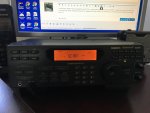Great comments here. I own most of the scanners mentioned here and have done extensive head to head testing on VHF and UHF with these scanners and dozens more, while sharing the same multicoupler and the same Diamond discone antenna. I'll offer the conclusions that I'm firm on after many hours of comparison testing:
BCT15X - Best all-around analog scanner. Modern enough with things like tone squelch, alpha tags, and great scan speed, but still somewhat old-school in performance. It's not the best in any band, but it's good enough in all bands, and overall it's my go-to analog scanner.
BC780XLT - The best scanner I've ever tested by far in the AM civilian airband, and on milair. Also the best scanner I've tested for weak signal VHF fire ground reception. Time and time again it pulls in the weak stuff in VHF and milair that nothing else will break squelch on. There is too much white noise on UHF audio, a bit of a bummer, but nothing is perfect right?
PRO-2006 - The best UHF scanner I've ever owned or tested. There is no comparison, at all. It pulls in the most distant and faint signals, even from patrol cars going car to car, sometimes many miles away. On one frequency this scanner can clearly pull in transmissions from a site that is about 50 miles away and behind hills to my antenna. We are talking UHF here, not VHF. The audio quality is clean and stellar. White noise during transmissions is minimal compared to other scanners. It has real squelch and volume knobs that feel "right". On UHF it can outperform the 780 head to head on the Arizona DPS frequencies, and can embarrass any digital scanner when it comes to receiving the most distant stuff. Not have tone squelch just sucks in 2019. Monitoring a bunch of AZ DPS frequencies, I'm bombarded by morse code identifiers all the time, and it gets old. Oh how I wish I had one of the rare tone-board equipped models. VHF and milair capabilities are good, but clearly can't match the 780.
BC9000XLT - I still own a mint condition model purchased in 1998 and I am in love with the large form factor, the top firing speaker, and the big VFO knob. Oh how I wish modern scanners had ergonomics more like this scanner. It's a good performer, but not stellar by any means. It's strong suit is VHF fire ground reception, but it has a high white noise level in the audio that puts a bit of a damper on listening to the weaker signal stuff. Still, it's a cherished part of my collection.
I've tested a lot of the newer Whistler scanners and have found them lacking for analog VHF / UHF. Even the original PSR scanners had a lot of issues for me here with intermod. The PSR-800 was pretty respectable with the UHF DPS system, but it's a handheld and never received head to head testing on the multicoupler so I can't make a definitive statement there.
I own a lot of scanners, but only the top dogs make it into my main cabinet, so I'll let this picture speak for itself.
View attachment 70091




